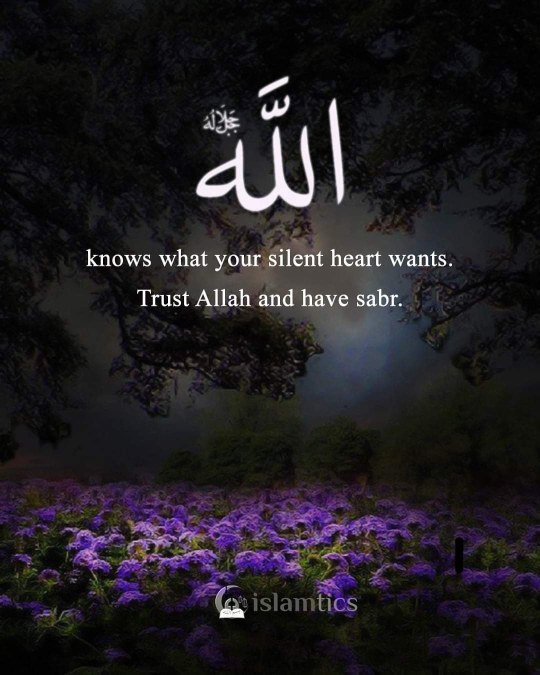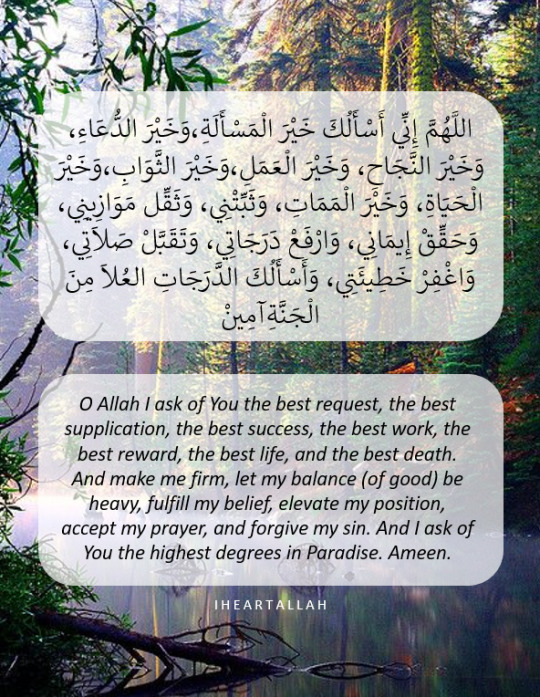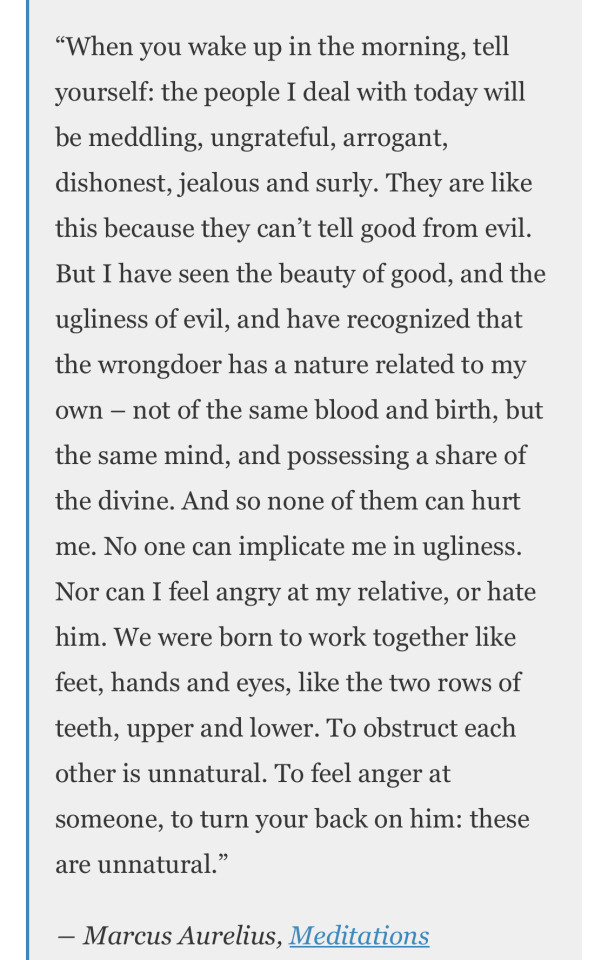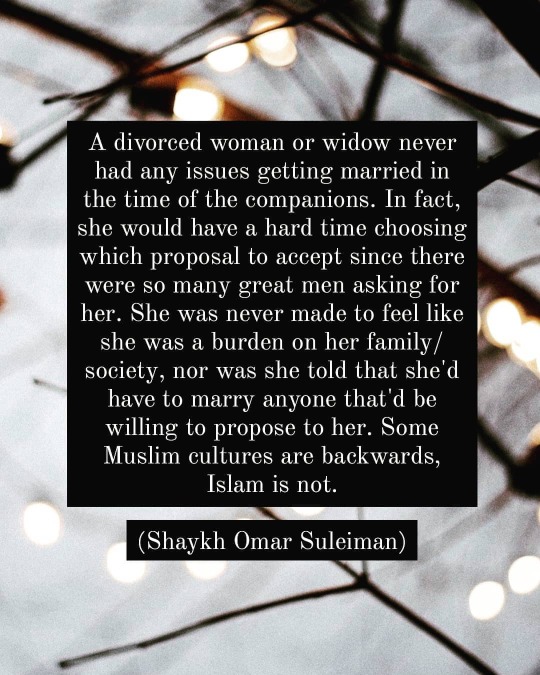Text
“A quick and easy way to check to see if you have a pure heart is seeing how readily willing you are to give a compliment to others. If your first instinct when you see something nice or hear about the success of someone you feel constricted then know you have jealousy in your heart. If you genuinely feel happy for the other person and you feel secure with yourself it will be very easy to happily give a compliment. If you see traces of jealousy in your heart, train yourself to be content by realizing that everything is portioned with great wisdom. No one is going to take anything away from you that was meant for you. Realize the wisdom in the distribution of wealth, knowledge, beauty, and success. This will ease your heart, prevent you from eating yourself up and allow you to enjoy the beauty & success of others while feeling secure within.”
— Halel Banani
377 notes
·
View notes
Text



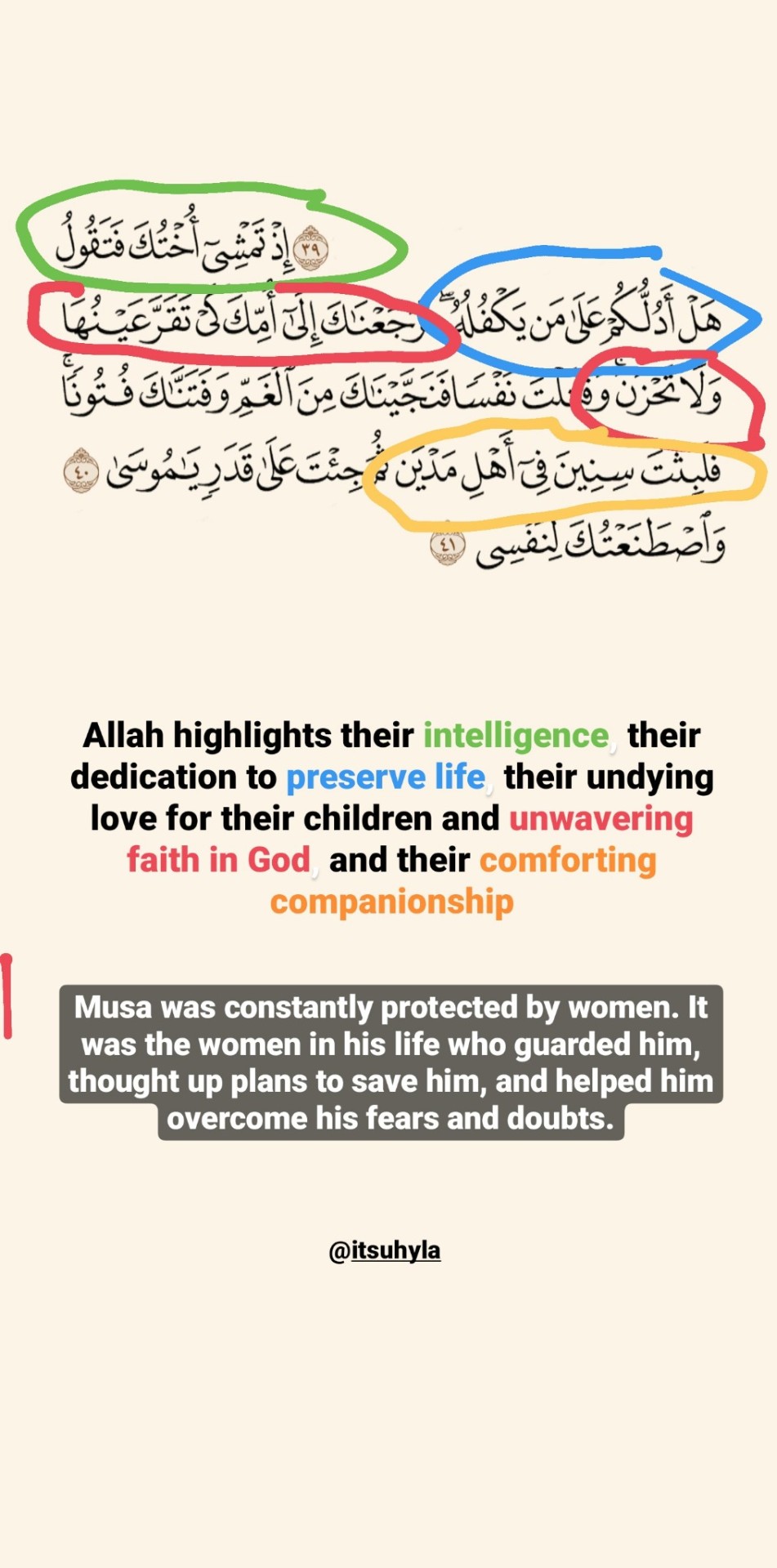
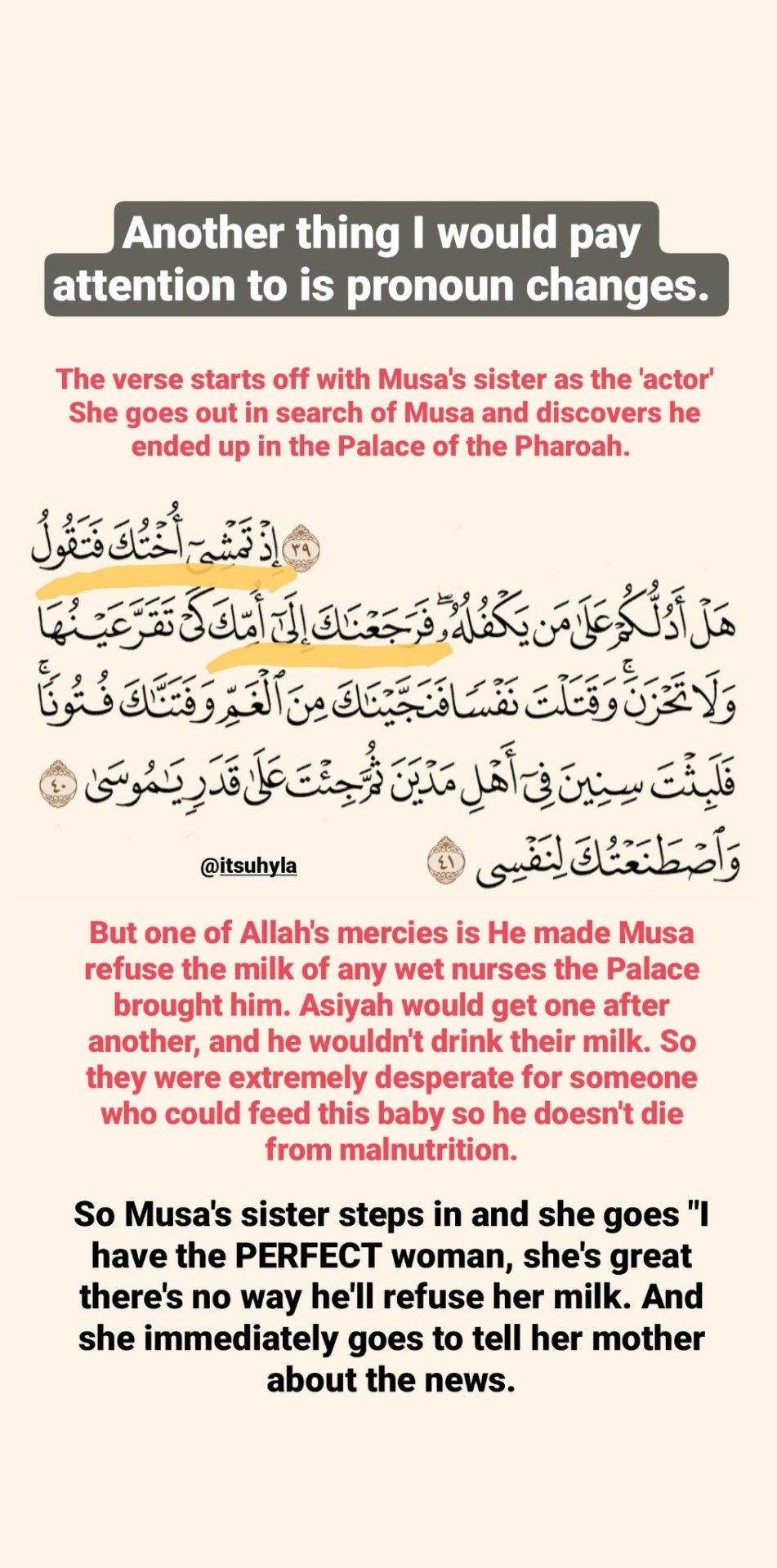
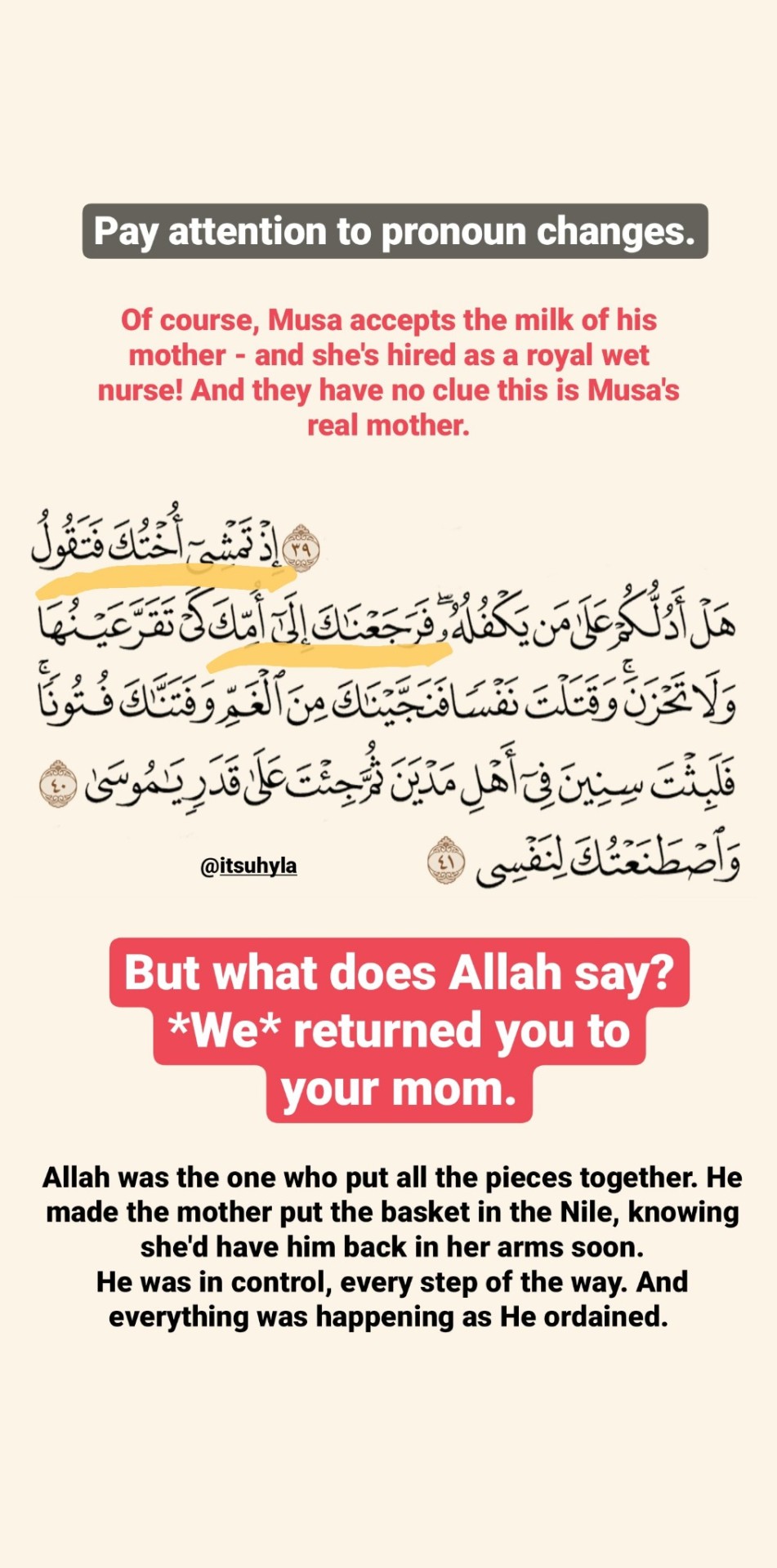
tadabbur of surah taha 💫
ramadan series - verse 40
163 notes
·
View notes
Text
There's an expression in Kashmiri — bahār hævnai — which literally means “may you witness spring” but there's a layer of meaning in the second word of the expression, which imbues it with a sense of “may God have you witness spring.”
It's said as a blessing, or as a way to encourage someone when they're feeling low. To convey the idea that the ups and downs of life are merely seasons, that even if one is passing through the heartless winter days of life, God will at some point bring about spring for you.
May you witness spring. Bahār hævnai.
971 notes
·
View notes
Text
Daily athkaar, protect yourselves dear brothers and sisters
أَعُوذُ بِاللهِ مِنَ الشَّيْطَانِ الرَّجِيمِ “اللهُ لَا إِلَهَ إِلَّا هُوَ الْحَيُّ الْقَيُّومُ لَا تَأْخُذُهُ سِنَةٌ وَلَا نَوْمٌ لَهُ مَا فِي السَّمَاوَاتِ وَمَا فِي الْأَرْضِ مَنْ ذَا الَّذِي يَشْفَعُ عِنْدَهُ إِلَّا بِإِذْنِهِ يَعْلَمُ مَا بَيْنَ أَيْدِيهِمْ وَمَا خَلْفَهُمْ وَلَا يُحِيطُونَ بِشَيْءٍ مِنْ عِلْمِهِ إِلَّا بِمَا شَاءَ وَسِعَ كُرْسِيُّهُ السَّمَاوَاتِ وَالْأَرْضَ وَلَا يَئُودُهُ حِفْظُهُمَا وَهُوَ الْعَلِيُّ الْعَظِيمُ”.
75. ‘A ‘oothu billaahi minash-Shaytaanir-rajeem. Allaahu laa ‘ilaaha ‘illaa Huwal-Hayyul-Qayyoom, laa ta'khuthuhu sinatun wa laa nawm, lahu maa fis-samaawaati wa maa fil-‘ardh, man thai-lathee yashfa'u ‘indahu ‘illaa bi'ithnih, ya'lamu maa bayna ‘aydeehim wa maa khalfahum, wa laa yuheetoona bishay'im-min ‘ilmihi ‘illaa bimaa shaa'a, wasi'a kursiyyuhus samaawaati wal'ardh, wa laa ya'ooduhu hifdhuhumaa, wa Huwal- ‘Aliyyul- ‘Adheem.
I seek refuge in Allah from Satan the outcast. - Allah! There is none worthy of worship but He, the Ever Living, the One Who sustains and protects all that exists. Neither slumber nor sleep overtakes Him. To Him belongs whatever is in the heavens and whatever is on the earth. Who is he that can intercede with Him except with His Permission? He knows what happens to them in this world, and what will happen to them in the Hereafter. And they will never encompass anything of His Knowledge except that which He wills. His Throne extends over the heavens and the earth, and He feels no fatigue in guarding and preserving them. And He is the Most High, the Most Great. [1] [1]Whoever says this when he rises in the morning will be protected from jinns until he retires in the evening, and whoever says it when retiring in the evening will be protected from them until he rises in the morning. It was reported by Al-Hakim 1 / 562, Al-Albani graded it as authentic in Sahihut-Targhib wat-Tarhib 1/273, and traces it to An-Nasa'i and At-Tabarani. He says that At-Tabarani’s chain of transmission is reliable (Jayyid).
بَسْمِ اللهِ الرَّحْمَنِ الرَّحِيمِ “قُلْ هُوَ اللهُ أَحَدٌ ۞ اللهُ الصَّمَدُ ۞ لَمْ يَلِدْ وَلَمْ يُولَدْ ۞ وَلَمْ يَكُنْ لَهُ كُفُوًا أَحَدٌ”
76. Bismillaahir-Rahmaanir-Raheem. Qul Huwallaahu ‘Ahad. Allaahus-Samad. Lam yalid wa lam yoolad. Wa lam yakun lahu kufuwan 'ahad. (Recite 3 times)
With the Name of Allah, the Most Gracious, the Most Merciful. Say: He is Allah (the) One. The Self-Sufficient Master, Whom all creatures need, He begets not nor was He begotten, and there is none equal to Him.
بَسْمِ اللهِ الرَّحْمَنِ الرَّحِيمِ “قُلْ أَعُوذُ بِرَبِّ الْفَلَقِ ۞ مِنْ شَرِّ مَا خَلَقَ ۞ وَمِنْ شَرِّ غَاسِقٍ إِذَا وَقَبَ ۞ وَمِنْ شَرِّ النَّفَّاثَاتِ فِي الْعُقَدِ ۞ وَمِنْ شَرِّ حَاسِدٍ إِذَا حَسَدَ”.
Bismillaahir-Rahmaanir-Raheem. Qul 'a'oothu birabbil-falaq. Min sharri ma khalaq. Wa min sharri ghaasiqin 'ithaa waqab. Wa min sharrin-naffaathaati fil-'uqad. Wa min sharri haasidin 'ithaa hasad. (Recite 3 times)
With the Name of Allah, the Most Gracious, the Most Merciful. Say: I seek refuge with (Allah) the Lord of the daybreak, from the evil of what He has created, and from the evil of the darkening (night) as it comes with its darkness, and from the evil of those who practice witchcraft when they blow in the knots, and from the evil of the envier when he envies.
a
بَسْمِ اللهِ الرَّحْمَنِ الرَّحِيمِ “قُلْ أَعُوذُ بِرَبِّ النَّاسِ ۞ مَلِكِ النَّاسِ ۞ إِلَهِ النَّاسِ ۞ مِنْ شَرِّ الْوَسْوَاسِ الْخَنَّاسِ ۞ الَّذِي يُوَسْوِسُ فِي صُدُورِ النَّاسِ ۞ مِنَ الْجِنَّةِ وَالنَّاسِ”.
Bismillaahir-Rahmaanir-Raheem. Qul 'a'oothu birabbin-naas. Malikin-naas. 'Ilaahin-naas. Min sharril -waswaasil-khannaas. Allathee yuwaswisu fee sudoorin-naas. Minal-jinnati wannaas. (Recite 3 times) With the Name of Allah , the Most Gracious , the Most Merciful. Say: I seek refuge with (Allah) the Lord of mankind, the King of mankind , the God of mankind , from the evil of the whisperer who withdraws, who whispers in the breasts of mankind, of jinns and men.[1] Al-Ikhlas 112:1-4. - Al-Falaq 113:1-5. - An-Nas 114:1-6 [1] Whoever recites these three times in the morning and in the evening, they will suffice him (as a protection) against everything. The Hadith was reported by Abu Dawud 4/322, and At-Tirmithi 5/567. See Al-Albani’s Sahih At-Tirmithi 3/182.
“أَصْبَحْنَا وَأَصْبَحَ الْمُلْكُ للهِ وَالْحَمْدُ للهِ، لَا إِلَهَ إِلَّا اللهُ وَحَدْهُ لَا شَرِيكَ لَهُ، لَهُ الْمُلْكُ وَلَهُ الْحَمْدُ وَهُوَ عَلَى كُلِّ شَيْءٍ قَدِيرٌ، ربِّ أَسْأَلُكَ خَيْرَ مَا فِي هَذَا الْيَومِ وَخَيْرَ مَا بَعْدَهُ، وَأَعُوذُ بِكَ مِنْ شَرِّ مَا فِي هَذَا الْيَومِ وَشَرِّ مَا بَعْدَهُ، رَبِّ أَعُوذُ بِكَ مِنَ الْكَسَلِ، وَسُوءِ الكِبَرِ، رَبِّ أَعُوذُ بِكَ مِنْ عَذَابٍ فِي النَّارِ وَعَذَابٍ فِي الْقَبْرِ”.
77. ‘Asbahnaa wa 'asbahal-mulku lillaahi walhamdu lillaahi, laa 'ilaaha 'illallaahu wahdahu laa shareeka lahu, lahul-mulku wa lahul-hamdu wa Huwa 'alaa kulli shay'in Qadeer. Rabbi 'as'aluka khayra maa fee haathal-yawmi wa khayra maa ba'dahu wa 'a'oothu bika min sharri maa fee haathal-yawmi wa sharri maa ba'dahu, Rabbi 'a'oothu bika minal-kasali, wa soo'il-kibari, Rabbi 'a'oothu bika min 'athaabin fin-naari wa 'athaabin fil-qabri.
We have entered a new day [1] and with it all dominion is Allah’s. Praise is to Allah. None has the right to be worshipped but Allah alone, Who has no partner. To Allah belongs the dominion, and to Him is the praise and He is Able to do all things. My Lord, I ask You for the goodness of this day and of the days that come after it, and I seek refuge in You from the evil of this day and of the days that come after it. [2] My Lord, I seek refuge in You from laziness and helpless old age. My Lord, I seek refuge in You from the punishment of Hell-fire, and from the punishment of the grave. [3]
[1] When you say this in the evening you should say 'Amsaynaa wa'amsal-mulku lillaah: “We have ended another day and with it all dominion is Allah’s.
[2]When you say this in the evening you should say: Rabbi 'as'aluka khayra maa fee haathihil-laylati, wa khayra maa ba'dahaa, wa 'a'oothu bika min sharri maa fee haathihil-laylati wa sharri maa ba'dahaa: “I ask You for the good things of this night and of the nights that come after it and I seek refuge in You from the evil of this night and of the nights that come after it.”
[3]Muslim 4/2088.
“اللَّهُمَّ بِكَ أَصْبَحْنَا، وَبِكَ أَمْسَيْنَا، وَبِكَ نَحْيَا، وَبِكَ نَمُوتُ وَإِلَيْكَ النُّشُورُ”.
78. ‘Allaahumma bika 'asbahnaa, wa bika 'amsaynaa, wa bika nahyaa, wa bika namootu wa 'ilaykan-nushoor.’
O Allah , by You we enter the morning and by You we enter the evening, [1] by You we live and and by You we die, and to You is the Final Return.[2] [1] When you say this in the evening, you should say: Allaahumma bika 'amsaynaa wa bika 'asbahnaa, wa bika nahyaa, wa bika namoot, wa 'ilaykal-maseer: “O Allah, You bring us the end of the day as You bring us its beginning, You bring us life and you bring us death, and to You is our fate.” [2]Sahih At-Tirmithi 3/142.’
“اللَّهُمَّ أَنْتَ رَبِّي لّا إِلَهَ إِلَّا أَنْتَ، خَلَقْتَنِي وَأَنَا عَبْدُكَ، وَأَنَا عَلَى عَهْدِكَ وَوَعْدِكَ مَا اسْتَطَعْتَ، أَعُوذُ بِكَ مِنْ شَرِّ مَا صَنَعْتَ، أَبُوءُ لَكَ بِنِعْمَتِكَ عَلَيَّ، وَأَبُوءُ بِذَنْبِي فَاغْفِر لِي فَإِنَّهُ لَا يَغْفِرُ الذُّنُوبَ إِلَّا أَنْتَ”.
79. Allaahumma 'Anta Rabbee laa 'ilaaha 'illaa 'Anta, khalaqtanee wa 'anaa 'abduka, wa 'anaa 'alaa 'ahdika wa wa'dika mas-tata'tu, 'a'oothu bika min sharri maa sana'tu, 'aboo'u laka bini'matika 'alayya, wa 'aboo'u bithanbee faghfir lee fa'innahu laa yaghfiruth-thunooba 'illaa 'Anta.
O Allah, You are my Lord, there is none worthy of worship but You. You created me and I am your slave. I keep Your covenant, and my pledge to You so far as I am able. I seek refuge in You from the evil of what I have done. I admit to Your blessings upon me, and I admit to my misdeeds. Forgive me, for there is none who may forgive sins but You. [1] [1] Whoever recites this with conviction in the evening and dies during that night shall enter Paradise, and whoever recites it with conviction in the morning and dies during that day shall enter Paradise, Al-Bukhari 7/150. Other reports are in An-Nasa'i and At-Tirmithi.
“اللَّهُمَّ إِنِّي أَصْبَحْتُ أُشْهِدُكَ وَأُش��هِدُ حَمَلَةَ عَرْشِكَ، وَمَلَائِكَتَكَ وَجَمِيعَ خَلْقِكَ، أَنَّكَ أَنْتَ اللهُ لَا إِلَهَ إِلَّا أَنْتَ وَحْدَكَ لَا شَرِيكَ لَكَ، وَأَنَّ مُحَمَّداً عَبْدُكَ وَرَسُولُكَ”.
80. ‘Allaahumma 'innee 'asbahtu 'ush-hiduka wa 'ush-hidu hamalata 'arshika, wa malaa'ikataka wajamee'a khalqika, 'annaka 'Antallaahu laa 'ilaaha 'illaa 'Anta wahdaka laa shareeka laka, wa 'anna Muhammadan 'abduka wa Rasooluka.’ (Recite 4 times)
O Allah , I have entered a new morning [1] and call upon You and upon the bearers of Your Throne , upon Your angels and all creation to bear witness that surely You are Allah , there is none worthy of worship but You alone , You have no partners, and that Muhammad is Your slave and Your Messenger. [2] [1] When you say this in the evening you should say, Allaahumma 'innee 'amsaytu: “O Allah, I have ended another day…”
[2] “Allah will spare whoever says this four times in the morning or evening from the fire of Hell, ” Abu Dawud 4/317. It was also reported by Al-Bukhari in Al-'Adab Al-Mufrad, An-Nasa'i in 'Amalul-Yawm wal-Laylah and Ibn As-Sunni. Nasa'i’s and Abu Dawud’s chains of transmission are good (Hasan), Ibn Baz, p. 23.
“اللَّهُمَّ مَا أَصْبَحَ بِي مِنْ نِعْمَةٍ أَوْ بِأَحَدٍ مِنْ خَلْقِكَ فَمِنْكَ وَحْدَكَ لَا شَرِيكَ لَكَ، فَلَكَ الْحَمْدُ وَلَكَ الشُّكْرُ”.
81. Allaahumma maa 'asbaha bee min ni'matin 'aw bi'ahadin min khalqika faminka wahdaka laa shareeka laka, falakal-hamdu wa lakash-shukru.
O Allah, whatever blessing has been received by me or anyone of Your creation [1] is from You alone, You have no partner. All praise is for you and thanks is to You.[2]
[1] When you say this in the evening, you should say: Allaahumma maa 'amsaa bee…: “O Allah, as I… enter this evening…”
[2] Whoever recites this in the morning, has completed his obligation to thank Allah for that day; and whoever says it in the evening, has completed his obligation for that night. Abu Dawud 4/318, An-Nasa'i 'Amalul-Yawm wal-Laylah (no. 7), Ibn As-Sunni (no. 41), Ibn Hibban (no. 2361). Its chain of transmission is good (Hasan), Ibn Baz, p. 24.
اللّهُـمَّ عافِـني في بَدَنـي ، اللّهُـمَّ عافِـني في سَمْـعي ، اللّهُـمَّ عافِـني في بَصَـري ، لا إلهَ إلاّ أَنْـتَ. (ثلاثاً)
اللّهُـمَّ إِنّـي أَعـوذُبِكَ مِنَ الْكُـفر ، وَالفَـقْر ، وَأَعـوذُبِكَ مِنْ عَذابِ القَـبْر ، لا إلهَ إلاّ أَنْـتَ . (ثلاثاً)
82. Allaahumma 'aafinee fee badanee, Allaahumma 'aafinee fee sam'ee, Allaahumma 'aafinee fee basaree, laa 'ilaaha 'illaa 'Anta. Allaahumma 'innee 'a'oothu bika minal-kufri, walfaqri, wa 'a'oothu bika min 'athaabil-qabri, laa 'ilaaha 'illaa 'Anta. (Recite 3 times)
O Allah, make me healthy in my body. O Allah, preserve for me my hearing. O Allah, preserve for me my sight. There is none worthy of worship but You. O Allah, I seek refuge in You from disbelief and poverty and I seek refuge in You from the punishment of the grave. There is none worthy of worship but You.[1] [1]Abu Dawud 4/324, Ahmad 5/42, An-Nasa'i, 'Amalul-Yawm wal-Laylah (no. 22), Ibn As-Sunni (no. 69), Al-Bukhari Al-'Adab Al-Mufrad. Its chain of transmission is good (Hasan), Ibn Baz, p. 26.
“حَسْبِيَ اللهُ لَآ إِلَهَ إِلَّا هُوَ عَلَيْهِ تَوَكَّلْتُ وَهُوَ رَبُّ الْعَرْشِ الْعَظِيمِ”.
83. Hasbiyallaahu laa 'ilaaha 'illaa Huwa 'alayhi tawakkaltu wa Huwa Rabbul-'Arshil-'Adheem. (Recite 7 times) Allah is sufficient for me. There is none worthy of worship but Him. I have placed my trust in Him, He is Lord of the Majestic Throne. [1] [1]Allah will grant whoever recites this seven times in the morning or evening whatever he desires from this world or the next, Ibn As-Sunni (no. 71), Abu Dawud 4/321. Both reports are attributed directly to the Prophet (SAW) (Marfu1). The chain of transmission is sound (Sahih). Ibn As-Sunni.
“اللَّهُمَّ إِنِّي أَسْأَلُكَ الْعَفْوَ وَالْعَافِيَةَ فِي الدُّنْيَا وَالْآخِرَةِ، اللَّهُمَّ إِنِّي أَسْأَلُكَ الْعَفْوَ وَالْعَافِيَةَ فِي دِينِي وَدُنْيَايَ وَأَهْللِي، وَمَالِي، اللَّهُمَّ اسْتُرْ عَوْرَاتِي، وَآمِنْ رَوْعَاتِي، اللَّهُمَّ احْفَظْنِي مِنْ بَيْنِ يَدَيَّ، وَمِنْ خَلْفِي، وَعَنْ يَمِينِي، وَعَنْ شِمَالِي، وَمِنْ فَوْقِي، وَأَعُوذُ بِعَظَمَتِكَ أَنْ أُغْتَالَ مِنْ تَحْتِي”.
84. Allaahumma 'innee 'as'alukal-'afwa wal'aafiyata fid-dunyaa wal'aakhirati, Allaahumma 'innee 'as'alukal-'afwa wal'aafiyata fee deenee wa dunyaaya wa 'ahlee, wa maalee , Allaahum-mastur 'awraatee, wa 'aamin raw'aatee, Allaahum-mahfadhnee min bayni yadayya, wa min khalfee, wa 'an yameenee, wa 'an shimaalee, wa min fawqee, wa 'a'oothu bi'adhamatika 'an 'ughtaala min tahtee.
O Allah, I seek Your forgiveness and Your protection in this world and the next. O Allah, I seek Your forgiveness and Your protection in my religion, in my worldly affairs, in my family and in my wealth. O Allah, conceal my secrets and preserve me from anguish. O Allah , guard me from what is in front of me and behind me , from my left , and from my right , and from above me . I seek refuge in Your Greatness from being struck down from beneath me.[1] [1]Sahih Ibn Majah 2/332 and Abu Dawud.
“اللَّهُمَّ عَالِمَ الْغَيْبِ وَالشَّهَادَةِ فَاطِرَ السَّماوَاتِ وَالْأَرْضِ، رَبَّ كُلِّ شَيْءٍ وَمَلِيكَهُ، أَشْهَدُ أَنْ لَا إِلَهَ إِلَّا أَنْتَ، أَعُوذُ بِكَ مِنْ شَرِّ نَفْسِي، وَمِنْ شَرِّ الشَّيْطَانِ وَشِرْكِهِ، وَأَنْ أَقْتَرِفَ عَلَى نَفْسِي سُوءاً، أَوْ أَجُرَّهُ إِلَى مُسْلِمٍ”.
85. Allaahumma 'Aalimal-ghaybi wash-shahaadati faatiras-samaawaati wal'ardhi, Rabba kulli shay'in wa maleekahu, 'ash-hadu 'an laa 'ilaaha 'illaa 'Anta, 'a'oothu bika min sharri nafsee, wa min sharrish-shaytaani wa shirkihi, wa 'an 'aqtarifa 'alaa nafsee soo'an, 'aw 'ajurrahu 'ilaa Muslimin.
O Allah, Knower of the unseen and the evident, Maker of the heavens and the earth, Lord of everything and its Possessor, I bear witness that there is none worthy of worship but You. I seek refuge in You from the evil of my soul and from the evil of Satan and his helpers. (I seek refuge in You) from bringing evil upon my soul and from harming any Muslim. [1] [1]Sahih At-Tirmithi 3/142 and Abu Dawud.
“بِسْمِ اللهِ الَّذِي لَا يَضُرُّ مَعَ اسْمِهِ شَيْءٌ فِي الْأَرْضِ وَلَا فِي السَّمَاءِ وَهُوَ السَّمِيعُ الْعَلِيمُ”.
86. Bismillaahil-lathee laa yadhurru ma'as-mihi shay'un fil-'ardhi wa laa fis-samaa'i wa Huwas-Samee 'ul- 'Aleem. (Recite 3 times)
In the Name of Allah, Who with His Name nothing can cause harm in the earth nor in the heavens, and He is the All-Hearing, the All-Knowing. [1] [1]“Whoever recites it three times in the morning will not be afflicted by any calamity before evening, and whoever recites it three times in the evening will not be overtaken by any calamity before morning.” Abu Dawud 4/323, At-Tirmithi 5/465, Ibn Majah 2/332, Ahmad. Ibn Majah’s chain of transmission is good (Hasan), Ibn Baz, p. 39.
“رَضِيتُ باللهِ رَبَّاً، وَبِالْإِسْلَامِ دِيناً، وَبِمُحَمَّدٍ صَلَى اللهُ عَلِيهِ وَسَلَّمَ نَبِيَّاً”.
87. Radheetu billaahi Rabban, wa bil-'Islaami deenan, wa bi-Muhammadin (sallallaahu 'alayhi wa sallama) Nabiyyan. (Recite 3 times)
I am pleased with Allah as my Lord, with Islam as my religion and with Muhammad (peace and blessings of Allah be upon him) as my Prophet.[1] [1]“Allah has promised that anyone who says this three times every morning or evening will be pleased on the Day of Resurrection.” Ahmad 4/ 337, An-Nasa'i, 'Amalul-Yawm wal-Laylah p. 4, Ibn As-Sunni (no. 68), At-Tirmithi 5/465. Its chain of transmission is good (Hasan), Ibn Baz, p. 39.
“يَا حَيُّ يَا قَيُّومُ بِرَحْمَتِكَ أَسْتَغِيثُ أَصْلِحْ لِي شَأْنِي كُلَّهُ وَلَا تَكِلْنِي إِلَى نَفْسِي طَرْفَةَ عَيْنٍ”.
88. Yaa Hayyu yaa Qayyoomu birahmatika 'astagheethu 'aslih lee sha'nee kullahu wa laa takilnee 'ilaa nafsee tarfata 'aynin.
O Ever Living One, O Eternal One, by Your mercy I call on You to set right all my affairs. Do not place me in charge of my soul even for the blinking of an eye (i.e. a moment). [1] [1] Its chain of transmission is sound (Sahih), Al-Hakim 1/545, see Albani, Sahihut-Targhib wat-Tarhib, 1/273.
89. 'Asbahnaa wa 'asbahal-mulku lillaahi Rabbil-'aalameen, Allaahumma 'innee 'as'aluka khayra haathal-yawmi: Fathahu wa nasrahu wa noorahu, wa barakatahu, wa hudaahu, wa'a'oothu bika min sharri maafeehi wa sharri maa ba'dahu.
We have entered a new day and with it all the dominion which belongs to Allah, Lord of all that exists. O Allah, I ask You for the goodness of this day,[1] its victory, its help, its light, its blessings, and its guidance. I seek refuge in You from the evil that is in it and from the evil that follows it. [2] [1] For evening recitation, say here: Amsayna wa ‘amsaal mulku lellaahi rabbil-‘aalameen, Allaahumma 'innee 'as'aluka khayra haathihil-laylati : Fathaha wa nasraha wa nooraha, wa barakataha, wa hudaaha, wa'a'oothu bika min sharri maafeeha wa sharri maa ba'daha “My Lord, I ask You for the good things of this night.”
[2] Abu Dawud 4/322. Its transmission chain is good (Hasan). See also Ibn Al-Qayyim, Zadul- Ma'ad 2/273.
“أَصْبَحْنَا عَلَى فِطْرَةِ الْإِسْلَامِ وَعَلَى كَلِمَةِ الْإِخْلَاصِ، وَعَلَى دِينِ نَبِيِّنَا مُحَمَّدٍ صَلَى اللهُ عَلِيهِ وَسَلَّمَ، وَعَلَى مِلَّةِ أَبِينَا إِبْرَاهِيمَ، حَنِيفَاً مُسْلِماً وَمَا كَانَ مِنَ الْمُشْرِكِينَ”.
90. 'Asbahnaa 'alaa fitratil-'Islaami wa 'alaa kalimatil-'ikhlaasi, wa 'alaa deeni Nabiyyinaa Muhammadin (sallallaahu 'alayhi wa sallama), wa 'alaa millati 'abeenaa 'Ibraaheema, haneefan Musliman wa maa kaana minal-mushrikeen.
We have entered a new day [1] upon the natural religion of Islam, the word of sincere devotion, the religion of our Prophet Muhammad (peace and blessings of Allah be upon him), and the faith of our father Ibrahim. He was upright (in worshipping Allah), and a Muslim. He was not of those who worship others besides Allah. [2] [1] When you say this in the evening, you should say: 'Amsaynaa 'alaa fitratil-'Islaam…: “We end this day…” [2]Ahmad 3/406-7, 5/123, An-Nasa'i, 'Amalul- Yawm wal-Laylah (no. 34), At-Tirmithi 4/209.
“سُبْحَانَ اللهِ وَبِحَمْدِهِ”.
91. Subhaanallaahi wa bihamdihi. (Recite 100 times) Glory is to Allah and praise is to Him.[1] [1] “Whoever recites this one hundred times in the morning and in the evening will not be surpassed on the Day of Resurrection by anyone having done better than this except for someone who had recited it more.” Al-Bukhari 4/2071.
“لَا إِلَهَ إِلَّا اللهُ وَحْدَهُ لَا شَرِيكَ لَهُ، لَهُ الْمُلْكُ وَلَهُ الْحَمْدُ، وَهُوَ عَلَى كُلِّ شَيْءٍ قَدِيرٌ”.
92. Laa 'ilaaha 'illallaahu wahdahu laa shareeka lahu, lahul-mulku wa lahul-hamdu, wa Huwa 'alaa kulli shay'in Qadeer. (Recite 10 times)
None has the right to be worshipped but Allah alone, Who has no partner. His is the dominion and His is the praise and He is Able to do all things. (Recite ten times [1] in Arabic or one time to ward off laziness.)[2] [1] Allah will write ten Hasanaat (rewards) for whoever recites this ten times in the morning, and forgive him ten misdeeds and give him the reward of freeing ten slaves and protect him from Satan. Whoever recites this ten times in the evening will get this same reward. An-Nasa'i, 'Amalul-Yawm wal-Laylah (no. 24). Its chain of transmission is sound (Sahih). Albani 1/272. Abu Hurayrah (RA) narrated that the Prophet (SAW) said: “Allah will write one hundred Hasanat for whoever says There is no God but Allah alone, He has no partner. To Allah is possession of everything, and to Him all praise is. He is Capable of all things’ ten times in the morning, and forgive him one hundred misdeeds. He will have the reward of freeing a slave and will be protected from Satan throughout the day unto dusk. Whoever says it in the evening will have the same reward.” Ahmad 8/704, 16/293. Its chain of transmission is good (Hasan), Ibn Baz, p. 44.
[2] Whoever recites this in the morning, will have the reward of freeing a slave from the Children of Isma'il. Ten Hasanaat (rewards) will be written for him, and he will be forgiven ten misdeeds, raised up ten degrees, and be protected from Satan until evening. Whoever says it in the evening will have the same reward until morning. Abu Dawud 4/319, 3/957, Ahmad 4/ 60, Ibn Majah 2/331, Ibn Al-Qayyim Zadul-Ma'ad 2/388. Its chain of transmission is sound (Sahih). Al-Albani 1/270.
“لَا إِلَهَ إِلَّا اللهُ وَحْدَهُ لَا شَرِيكَ لَهُ، لَهُ الْمُلْكُ وَلَهُ الْحَمْدُ، وَهُوَ عَلَى كُلِّ شَيْءٍ
قَدِيرٌ”.
93: Laa 'ilaaha 'illallaahu wahdahu laa shareeka lahu, lahul-mulku wa lahul-hamdu, wa Huwa 'alaa kulli shay'in Qadeer. (Recite 100 times upon rising in the morning)
None has the right to be worshipped but Allah alone, Who has no partner. His is the dominion and His is the praise and He is Able to do all things. [1] [1] Whoever recites this one hundred times a day will have the reward of freeing ten slaves. One hundred Hasanaat (rewards) will be written for him, and one hundred misdeeds will be washed away. He will be shielded from Satan until the evening. No one will be able to present anything better than this except for someone who has recited more than this. Al-Bukhari 4/95, Muslim 4/2071
21 notes
·
View notes
Text
"If someone says today I will lock myself up from Asr till Maghrib and read 5 juzz of Quran, you tell him no. Today is the day of duaa. If he says, I will spend my day giving charity and helping others, you tell him these are noble deeds but not for today. Today is the day of Arafah, it's a day for you. Today is the day of duaa!"
36 notes
·
View notes
Text
You are sick enough, you deserve to get help. You do not have to wait until you almost break yourself into pieces to get help. You do not have to wait until you can barely function to get help. You do not have to wait to you hit rock bottom to get help. The sooner you get help, the sooner you will feel better again. Look if we see it like a ladder, if the top of the ladder is you doing great, and the bottom is you not being able to function: There is a lot of steps from the bottom to the top. You do not have to wait to get help to you reach the bottom. The sooner you get help, the fewer steps you have to climb. 🌸
654 notes
·
View notes
Text
Watch "Khutbah: Emotionally Traumatized, Spiritually Recovering" on YouTube
youtube
Emotionally Traumatised, Spiritually recovering..
Nice to see this topic being covered. Mental health, trauma and abuse isn't very well covered in Islamic talks, we tend to think the Quran doesn't touch on it. It's relieving to know it does and important for this information to be more out there! Especially with mental health on the rise and with abusive behaviours being wrongfully justified by Islam for far too long.
0 notes
Text
“God loves you more in a moment than anyone could in a lifetime.”
—
161 notes
·
View notes
Note
Assalamualaikum, what is the ruling in regards to Muslim women adopting or fostering, is she not allowed to uncover her hair in front of her own Fostered or adopted son?
Alaikumassalam wa rahmatullah,
She would only be permitted to take off the hijab before him if she has breastfed the boy. If not, then he would be a non-mahram to him like any other unrelated male. So adopting a child does not change their legal status toward the family when it comes to rules on interaction.
6 notes
·
View notes
Text

and I oop
39 notes
·
View notes
